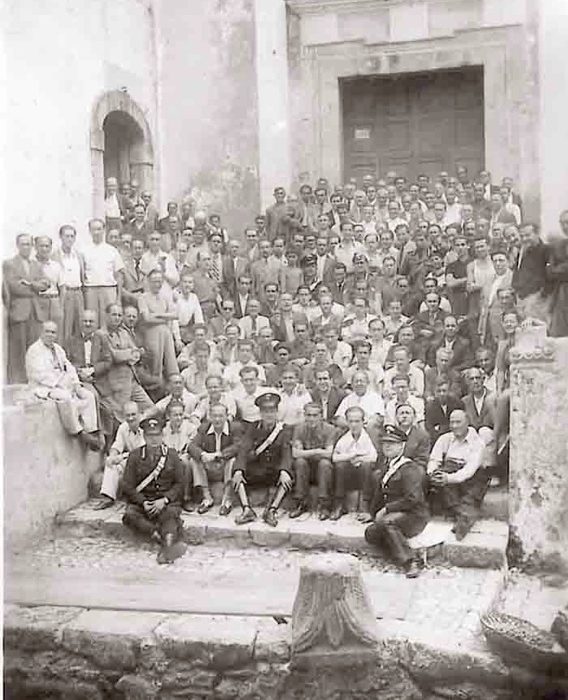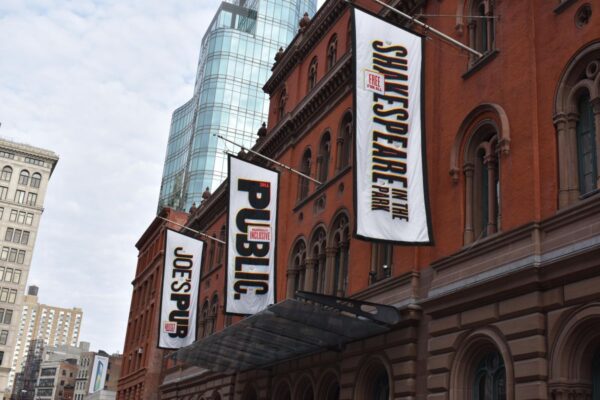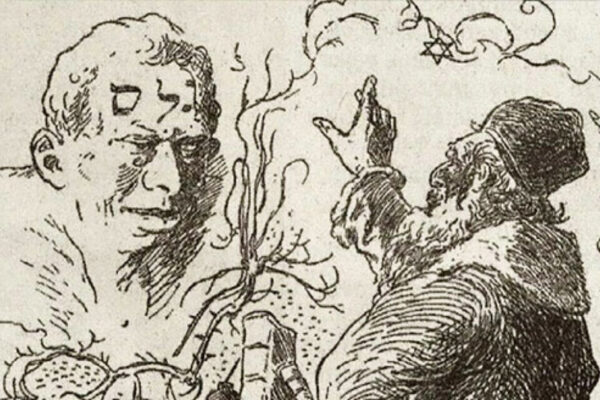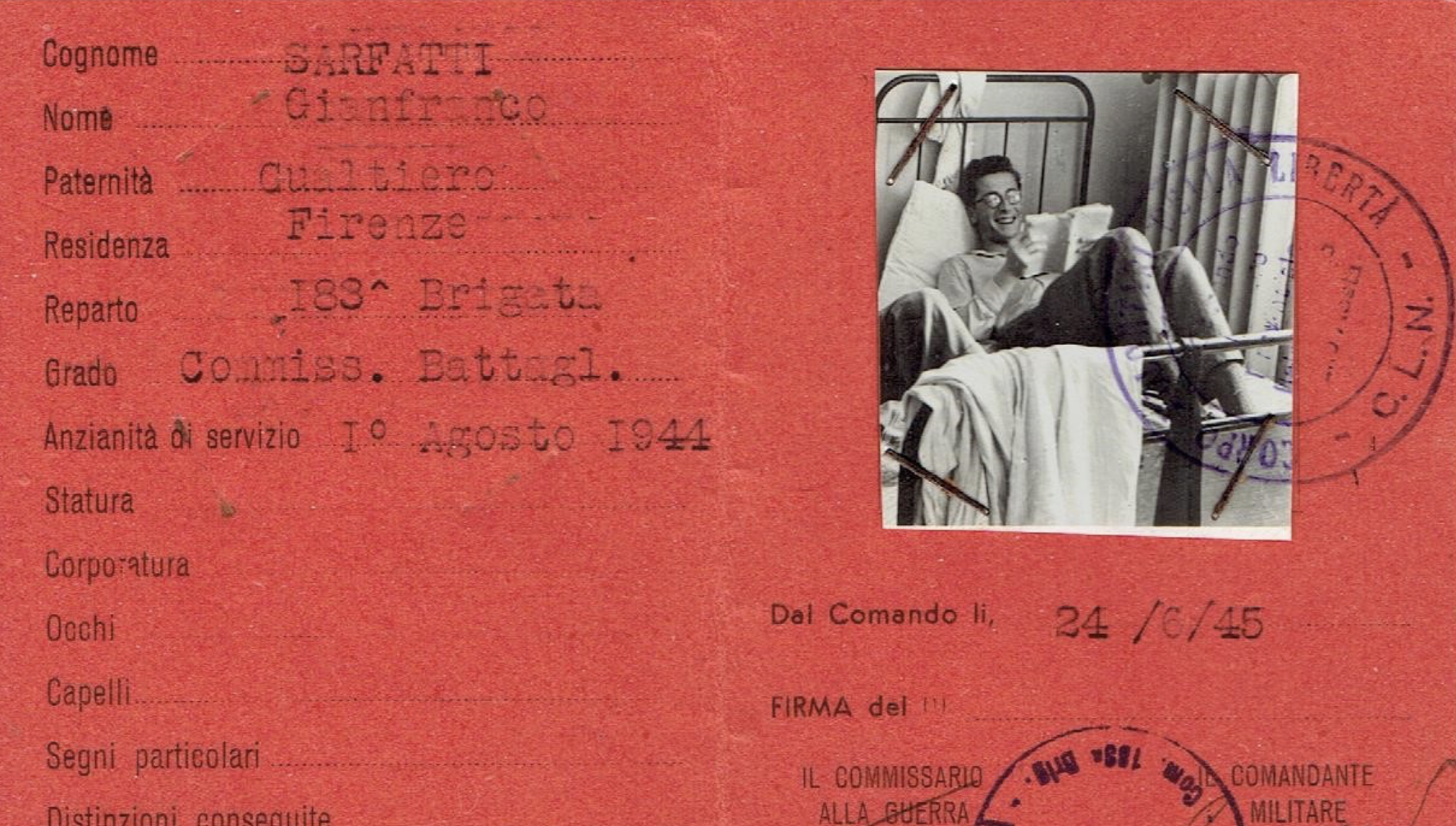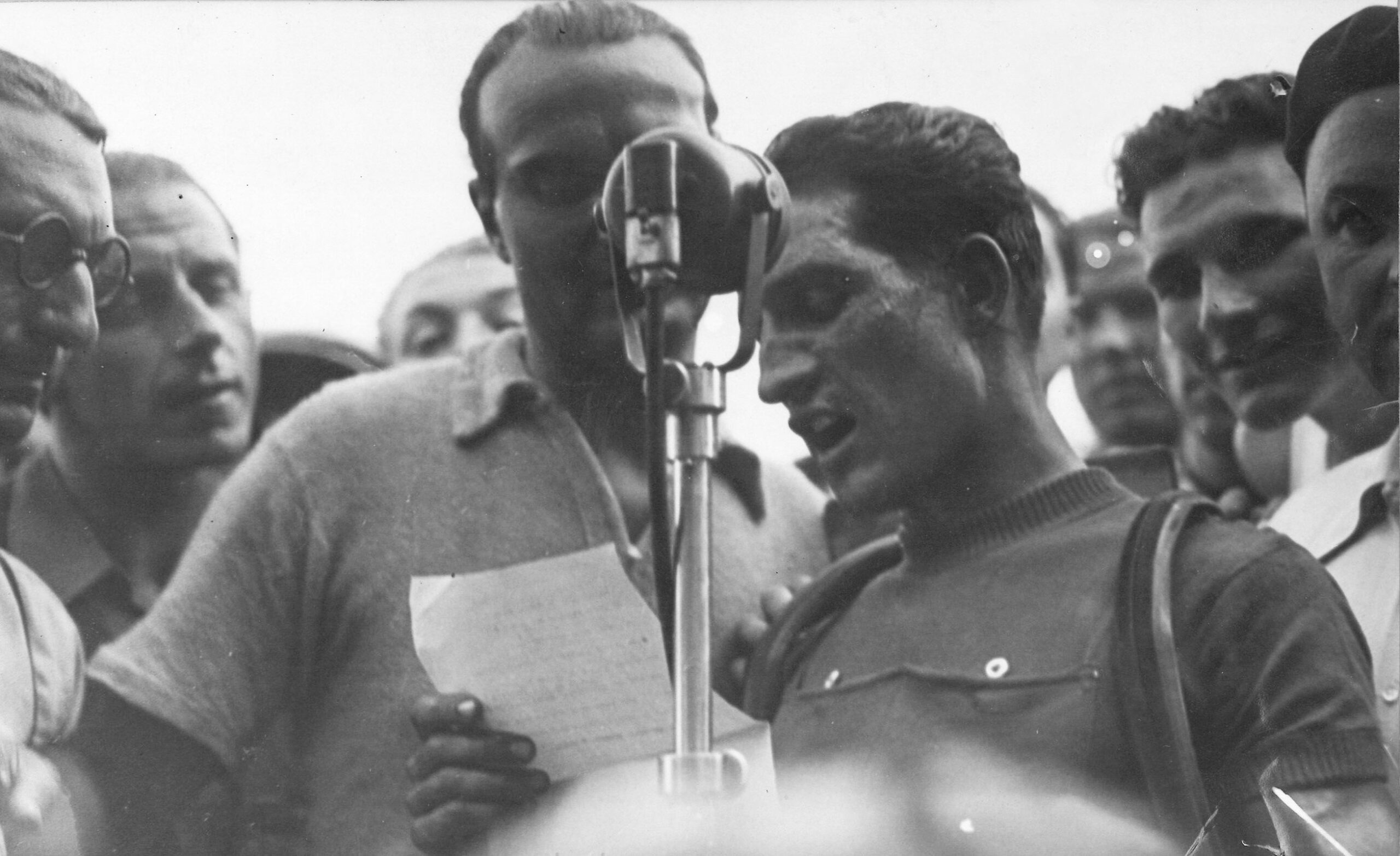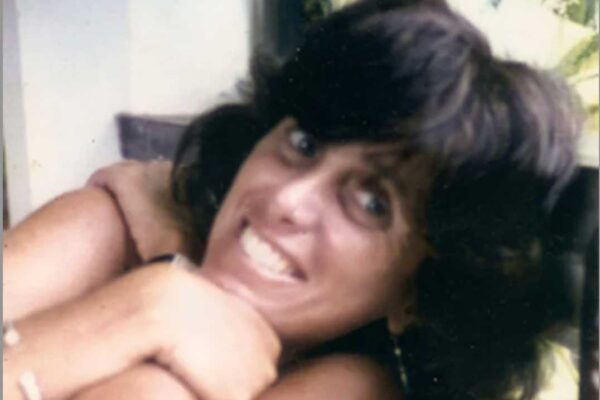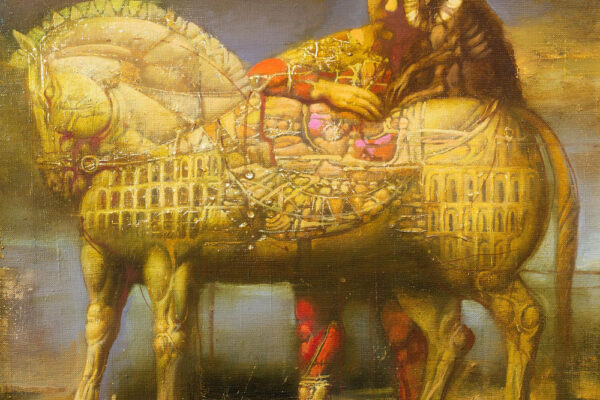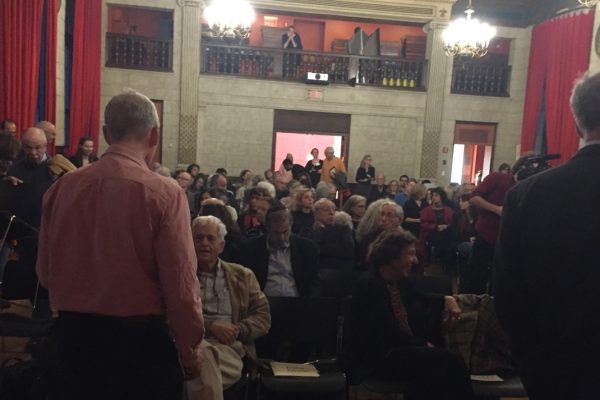DELASEM. The Unhailed Organization That Assisted Thousands of Jewish Refugees.
Interview by Alessandro Cassin
From Hitler’s raise to power in 1933 up to the early 1940’s, Italy was one of the few countries that accepted – both officially and trough legal-loopholes – thousands of foreign Jews fleeing persecution in their countries. The survival of these refugees (the majority of whom was interned in camps or sent to force residency in small towns) would have been unimaginable without the help of Italian Jewish relief organizations.
Following the Racial Laws of 1938, Mussolini’s government disbanded COMASEBIT (Commission for the relief of Jews in Italy), an organization established in Milan consequent to the arrival of the first wave of refugees from Austria, Germany and Czechoslovakia. In late 1939, as Jewish refugees continued arriving, the Union of Italian Jewish Communities set up the Delegation for the Assistance of Jewish Emigrants (Delegazione per l’Assistenza degli Emigranti Ebrei) or DELASEM. The headquarters were moved from Milan to Genoa under the chairmanship of Lelio Vittorio Valobra. Funds came mainly through Paris, from international Jewish institutions such as the American Jewish Joint Distribution Committee and the Hebrew Immigrant Aid Society, as well as from the Italian Jewish Communities.
Faced with apparently insurmountable difficulties, the people of DELASEM showed enormous courage and great effectiveness in providing, housing, and in many cases facilitating the illegal emigration of thousands of foreign Jews, effectively saving their lives.
Headed by Lelio Valobra, DELASEM relied also on a broad and inclusive network of volunteers and sympathizers among the Italian Jewish community, members of the resistance, priests, regular citizens, as well as some police officers and even a few members of the Fascist state apparatus. At a distance of over 70 years, it is hard to overstate the crucial impact of DELASEM’s actions on the fate of thousands of refugees, who, in addition to life saving material assistance, received also the much needed human solidarity from their Italian coreligionists.
In the interview that follows, Donato Grosser, son of Bernardo (Berl) Grosser, one of the key figures in DELASEM, reconstructs aspects of the little known story of this relief organization, including some episodes seemingly out of a thriller, based on what he learned directly from his father.
Alessandro Cassin: Historically the Italian Jewish Community has been quite diverse and divided. Individual communities preserved their customs for centuries and nationwide initiatives were rare. Yet in 1930’s, in only a few months, the Union of Italian Jewish Communities was able to set up a national organization to assist Jewish refugees arriving from Germany and Eastern Europe. How did they manage?
Donato Grosser: One should keep in mind that in early thirties there was no real national relief organization in Italy. There were local organizations, in Milan, in Trieste, in Rome. The first national Jewish relief organization was set up in 1939. What brought it into existence was an emergency, which forced the different Jewish communities to get together. The Jewish leadership realized they were facing both a national crisis and international one, as a wave of foreign refugees was arriving in need of assistance.
A.C. Looking at the range of activities and impact of the Jewish relief organizations active in Italy between 1933-1946, one wonders how it was all possible, given their miniscule size and the haste with which they were set up. Among the plausible explanations that have been offered, one is the know-how and financial help provided by American Jewish relief organizations. There was the extraordinary courage and ability of the small group who led them, as well as the help from different sectors of Italian civil society. After years of researching this, could you share your views?
D.G. What I know about this subject I learned first hand from my father. My later research only confirmed and clarified what he had already told me. I believe the main reasons for the success of these small rescue and assistance organizations was the financial support of the Italian Jewish communities and of philanthropists such as Sally Mayer, the Shapira family and others. DELASEM raised about 30-40% of its funds in Italy. DELASEM’s leadership was a group of extraordinary people, who knew how to operate under extremely difficult circumstances. The money that came from the Joint and other international organizations was crucial, allowing for a much broader range of activities. However, I am convinced that even without international support, DELASEM would still have been able to operate, though on a significantly reduced scale. And lastly, DELASEM enjoyed support that proved to be essential from sectors of Italian society and of the Catholic Church.
A.C. In the decade between 1933 and 1943, a large number of foreign Jews, arrived in Italy in a flight for survival. While most European countries refused to accept them, Italy let them in. Do you think it was Mussolini’s decision?
D.G. Definitely. It was a decision of the Italian Fascist government, the highest level of the government. They were not happy that so many people came in, but they could not send them back because the Nazis would not allow it. The situation forced Mussolini to allow entrance, perhaps reluctantly. I think Mussolini was not interested in killing the Jews, he wanted to exploit them if possible and then get rid of them.
A.C. Your father, Berl Grosser, arrived in Italy as a refugee in the crucial year of 1938, as the regime was implementing the Racial Laws. Within months he had taken a prominent position within COMASEBIT. Could you trace the evolution and transformation of the Italian Jewish relief organizations up to that point?
D.G. Before 1938, COMASEBIT had been run by Raffaele Cantoni, who was and remained the eminence grise behind it. In fact in Milano COMASEBIT had officially appointed Renzo Luisada as its President. Luisada was an artist, a painter and worked at Cantoni’s directives. The organization did good work, but remained in existence only for a short time. As the Fascists realized that COMASEBIT was in effect headed by Cantoni, a well known socialist sympathizer and antifascist, they shut it down. However, they soon realized that in the face of thousands of refugees arriving into the country something needed to be done. The Union of Italian Jewish Communities convinced Mussolini that if they could not offer some kind of assistance, the burden would fall directly on the government: someone had to take care of all these people.
A.C. What options did the Fascists government consider?
D.G. Sending them back was not an option; Germany and Eastern European countries under Nazi occupation did not want them. Mistreating them would have enormously damaged Italy’s international image. Mussolini had to consider that his country’s greatest “export” at the time were its emigrants. There were millions of Italian living abroad, so the regime felt that mistreating foreigners in Italy would result in the mistreatment of the Italian abroad. The Fascists also believed that allowing Jews to enter Italy would bring much needed foreign currency into the country. Italy was under embargo from the Society of Nations; therefore anyone bringing in currency was welcome.
A.C. As Italy entered the war in 1940, legislation was passed to expel foreign refugees…
D.G. The law was one thing, what actually happened was quite different. Expulsions never reached mass proportions. In fact more kept coming in. There was a fantastic thing: the tourist visa! The economic pressure was such that the whole tourist industry, from compagnie di navigazione to hotels, was in crisis. Jews arriving in those years, some of them with money, were seen as a bonanza.
A.C. What brought your father to COMASEBIT?
D.G. After three months in Italy he had already mastered the language. As the money he had brought with him from France was running out, he began looking for a job. He told me that one night he had a dream, and in the dream someone told him to go to a certain place. Once awake he went there and found the offices of COMASEBIT. He was hired on the spot, largely for his language skills: he spoke German, Italian, English, French and Yiddish. German and Yiddish speakers were hard to find, and fluency in those languages was indispensible in a time when so many refugees from Germany and Eastern Europe were pouring in.
A.C. What was his initial role with the organization?
D.G. The first day Luisada gave him letters to write; as he recognized his quickness and competence, he soon let him handle massive quantities of correspondence independently. Following directives and teaching himself along the way, my father became the point of reference for the refugees.
A.C. When COMASEBIT closed down and DELASEM was formed, your father was relocated to Genoa?
D.G. When they closed the office in Milan, only two people were invited by Lelio Valobra to join the office in Genoa: Enrico Luzzatto Pardo, the segretario (which basically meant Director), and my father who at the time was segretario aggiunto and later co- segretario. Lelio Vittorio Valobra had his own law practice (he had been exempted from the Racial Laws as an early Fascist party member and for having served with honor in World War 1) and met with Luzzatto and my father after dinner from 8 p.m. on some days until midnight in his office. At Delasem, Luzzatto was in charge of contacts with international Jewish organizations, while my father dealt directly with the refugees.
A.C. How many people worked for DELASEM at that time?
D.G. There were about 14 paid employees plus a fluctuating number of volunteers. Most of the fourteen people were working with the refugees and Grosser was running the office as chief of personnel.
A.C. In 1939 after Mussolini decided to close down COMASEBIT, he found that the Fascists authorities could not handle the Jewish Refugee problem and ended up allowing DELASEM (the next incarnation of the Italian Jewish relief organization) to operate in the country. To what extent do you feel the Fascists were really aware of DELASEM’s activities?
D.G. This will be of course a conjectural answer: I think the authorities knew everything that DELASEM was doing. Probably the telephones were tapped, mail intercepted and their movements closely monitored. Don’t forget that DELASEM’s leadership had to report to the Fascist police on a daily basis. The mail was definitely censored: the proof was that when one of organization’s employees, Manfred Danzig wrote to friends abroad that the situation in Italy was deteriorating, the police warned him not to write negatively about Italy. After he did this again, he was eventually sent to confino (forced residency in a small town) and eventually ended up in the internment camp of Ferramonti.
A.C. Foreign Jews interned in camps or sent to forced residency programs in small towns received small subsidies, which were insufficient and often came irregularly. They survived because of the money sent by DELASEM. How did DELASEM procure the money to assist them?
D.G. At that time most of the money came from the Joint and part of it came from Italy. In every camp there was a DELASEM representative.
A.C. Were the representatives largely volunteers?
D.G. Yes they were all volunteers.
A.C. What happened in the small towns?
D.G. I am not sure, how the money was delivered there. Certainly DELASEM was aware of all the towns where Jews had been sent to. My father knew and became friends with various people who had been DELASEM representatives, like the one in Ferramonti; one of them was professor Samuel Avisar. (The name Avisar is the name he took after the war, his previous last name was Rewisorsky). He also was a Musmach, a rabbinical title he got at the rabbinical college in Rome.
A.C. Despite its size, DELASEM was active not only within Italy, but to some extent in the Italian occupied territories as well.
D.G. Rhodes was an Italian island, part of the annexed Italian territories. When Jewish refugees arrived there, somebody had to take care of them. Delasem had a representative in Rhodes, Mr. Giacobbe Franco, who distributed the funds necessary to the help the castaways of the Pentcho, a river boat from Bratislava whose boiler burst near an uninhabited island in the Aegean sea.
A.C. Refugees were entering Italy from many different places, under different circumstances. How and where did they find out about the existence of DELASEM?
D.G. Most of them knew about this organization before arriving. The most common plan was to enter Italy with a tourist visa and then contact DELASEM. I am convinced that Jews in Germany, Austria and Czechoslovakia decided to enter Italy knowing that once there, “someone” would help them. Once in Italy they found their way to the office and simply knocked at the door.
A.C. Thousands of people arrived within a relative short period of time; it must have been overwhelming …
D.G. It was! There were hundreds of requests arriving by letter each day, plus families arriving in person: the office worked 18 hours a day. My father was so driven that some considered him a dictator. At a certain point the employees went on strike for a day, but Valobra supported my father.
A.C. Did the original Genoa DELASEM group keep in touch after 1943?
D.G. On September 8, 1943, as the Nazi Fascists began a manhunt for Jews. Everyone tried to hide. Luzzatto was arrested that fall and the Nazis used him as a translator. The role of “translator” was highly compromising. They may have also used him to make phone calls that led to arrests of other people… After the war he was accused of being a Nazi collaborator and put in jail. Valobra and my father tried to get him out. They knew that whatever he had done under duress had been against his will. He was in fact a prisoner. The rest of the group, with some exceptions, dispersed. Manfred Danzig, who had been in charge of luggage and personal possessions, remained one of my father’s best friends in the post war period.
A.C. Clearly the work that DELASEM carried out required very specific skills: great courage, psychological insight, foreign languages, and much more. Do you think that your father as a young man had already displayed a particular disposition to helping those in need, or did the circumstances bring this out?
D.G. Being an Ostjude (Eastern Jew) born in Galizia and educated in public schools in Germany, my father had experienced firsthand anti-Semitic hatred. Because of this he sensed the value of doing good for other people, he had what is call Ahavat Israel (love for every Jew) in his blood. In addition to that, my father was a born salesman; the combination of these two qualities was perfect for a wartime relief organization.
A.C. In 1942 DELASEM rented Villa Emma, near Modena, where they housed many children…
D.G. Villa Emma belonged to the Friedman family. They were one of few rich Jewish families. DELASEM found out that they owned the villa and asked for permission to use it. It seemed an ideal place to allow large groups of young refugees to stay together in one place. It was a very good solution on many levels. The first group arrived through Austria and was composed mainly of Polish children and students from religious families. A second group came from Spalato in Dalmatia (later renamed Split, now Croatia). They all stayed together at Villa Emma.
A.C. After September 8, 1943 everything changed: in the north the Repubblica Sociale Italiana was established, and DELASEM became clandestine. What were they able to do at that point?
D.G. After the Armistice of September 8, my father and everybody else who worked at DELASEM in Genoa had to go into hiding. They needed to hide documents and dispose of the money they had in a hurry. Eventually they gave all their funds, approximately 100.000 Lira, (a large sum at the time), to Don Francesco Repetto, a catholic priest who agreed to continue the activity. Don Repetto began assisting refugees while working under archbishop Boetto of Genoa. Valobra and Raffaele Cantoni, who knew and trusted him, personally arranged this. In Genoa there was also this amazing character, Massimo Teglio, later nicknamed Primula Rossa (The Scarlet Pimpernel), who took over part of the work of Delasem operating under a false name. He was an airplane pilot with experience in flying hydroplanes. From Genoa, in order to take off from the water, you have to fly toward land, where the wind comes from and take off at the last minute when you got near the shore. My father remembered this man as fearless, he had stayed in Genoa with fake papers, (as told in Alexander Stille’s book “Uno su Mille”, in English, “Benevolence and Betrayal”) and continued the work clandestinely. The scope of his action was much more limited, but he, along with a few others in different cities, did his best. There was a Mr. Finzi in Bologna, somebody in Tuscany, another one in Piedmont. And one or two in Rome. All working clandestinely.
A.C. Where did your father hide?
D.G. When Genoa became too dangerous he went into hiding in a small village in the mountains, called Teriasca, near Sori on the Ligurian coast. The village could be reached through a mountain path in an hour and a half on the back of a donkey. After a few days my father set up a school in order to teach people how to read and write. A few weeks later he realized that the locals, though good and decent people, had been talking in Sori about the presence of a Jew in their village. He left quickly before the Nazi-Fascists could come for him.
A.C. On the run he proved extremely resourceful…
D.G: He found another place in Milan. There he stayed for a month at the home of Giovanni Barbieri, an antifascist member of the Partito Repubblicano (Republican Party). In the meantime Raffaele Cantoni arranged for his escape to Switzerland. The first time he tried to escape via Luino, but was stopped by the Swiss border guards who sent him back. He returned to Milan by train, a very dangerous thing. He was caught by the curfew in the Milan train station, unable to go anywhere. He was quietly sitting in the station when a guardia repubblicana (Fascist militia) said “documents!” My father was carrying false papers and knew he could have been arrested and deported. Instead of giving his papers he made a face and long sound like “Uouhh”- I remember my father making this face every time he would tell the story – and the guard said: “this guy is an idiot, let’s continue”. He had many close calls. Another time in Genoa the allies bombed the city and everybody tried to find refuge in the train tunnels under the mountains. A German soldier had also found refuge there and he told him: du bist ein Jude. My father played dumb and made gestures as if he didn’t understand what he said. There were other episodes of the same kind…
A.C. Eventually he did make it to Switzerland?
D.G. Yes, he went north from Sondrio in the direction of Saint Moritz, and that time they let him in. Valobra was already there, and it was thanks to him that the Swiss border guards had my father’s name on the list of those who were allowed entrance. It was on Christmas Eve, 1943.
A.C. In Switzerland did he reconnect with Cantoni and his DELASEM companions?
D.G. He met Cantoni at the Rikon refugee camp in January 1944. My father was moved between two or three camps, maybe more. One was Raron, and I have a Siddur Tefillà, that was used during Rosh Hashanà, 1944.
A.C. After the war, did he return to Italy?
D.G. Eventually, but things were complicated. He only had a Polish passport that he could not use since the Polish Government had voided all passports issued to Jews. The war ended on April 25, 1945, and my father was able to return to Italy only at the end of August. In the meantime he was in charge of the Italian Jewish school in Weggis. So even in Switzerland he basically continued the work of DELASEM.
A.C. To what extent do you think certain individuals within the Catholic church helped the activities of DELASEM? And how much support did DELSAM get from Italian civil society?
D.G. The clergymen and women who helped before September 8th, mostly continued to help later. Among them was Don Casini in Firenze, Padre Benedetto in Rome, Don Repetto in Genoa and other people in Piedmont. Some of these people were later declared “Righteous Among the Nations”. They helped enormously. They helped to feed, hide and often save hundreds of people. Don Repetto believed that he was doing the volontà (wish) of the Pope. We don’t know anything about what the Pope was really thinking, yet that is how they interpreted it.
AC: Today, some people are working toward the canonization of Pope Pius XII …
D.G. The hardest thing in evaluating the action of the Pope is the fact that the Vatican has never fully opened its archives. We do not know exactly what instructions he gave or did not give.
What we do know is that Pius XII was a diplomat, a negotiator. He had been Nuncio Apostolico in Germany and then Vatican’s Secretary of State. He signed a Concordato (pact) with Hitler and Mussolini, which were awful things to do, because once you make a concordato with such assassins, you empower them. Perhaps in the short term he felt he was saving the Catholic institutions, but in doing this he weakened his moral authority. His hands were tied by this Concordato. As things escalated, he tried to keep himself neutral, which was no longer really possible. We do not have the knowledge to formulate a clear judgment on the Pope, but surely his papacy failed to oppose the barbarism that had taken over Europe. On the other hand, when many monasteries opened their gates to hide Jews, he was certainly aware of what was happening.
A.C. Is neutrality morally acceptable in a time of crisis and genocide?
D.G. The Vatican’s neutrality was ambiguous at best: there were a couple of thousand of clergymen working in the Repubblica Sociale (RSI). In the RSI, the Nazi’s explicitly put the Brigate nere lead by Alessandro Pavolini, on a manhunt for Jews and partisans. Most of the Jews arrested in Italy and later deported were arrested by Italian Fascists. There were also two battalions of Italian SS, who swore directly to Hitler. The clergymen who worked closely with the Italian SS and with the Brigate Nere never received instructions from the Vatican, such as: “these are the bad guys don’t help them ”. The Pope allowed monasteries to hide Jews, at the same time he allowed his priests to join the Fascist Black Brigades who were hunting Jews.
A.C. Your father was a key figure in DELASEM, devoting all his energies to the organization for three long years, from December 1939 to September 1943. He survived the war and lived a long full life reaching the age of 96. How did the years at DELASEM impact the rest of his life?
D.G. For him those were the glorious years! Only during the last part of his life did historians such as Klaus Voigt discover and contact him. He was very proud of what he did. No other experience in his life compared to that; he would say, “there is nothing like saving lives”. His involvement with DELASEM was decisive on many different levels: for one thing it turned him into an Italian Jew. He developed a vast network of contacts both in Italy and later in Switzerland. Among others, he became very close with Sally Mayer and his son Astorre. Sally Mayer came to Genoa almost on a weekly basis from Milan to bring financial help and to look at the work of Delasem.
A.C. What did your father do after the war?
D.G. My father wanted to seek independent employment, but Reuben Resnick, the head of the American Joint in Italy called him, took him into his office, opened the door to the waiting room and showed him 50 people waiting for assistance. “I can’t handle this”, he said. “Grosser you have to help me!” So that’s how he began working for the American Joint Distribution Committee: it became a question of conscience.
A.C. Did he find satisfaction in this new role?
D.G: He only lasted 7 or 8 months, and then he quit. He had discovered that after Mr. Resnick left Italy, the head of the Joint in Italy, instead of delivering goods and food to refugees in D.P. camps, was directing trucks elsewhere. As he saw this, my father walked into the office and resigned on the spot. That day he came home crying, he only had money for a week. A week later, he found employment as manager of a factory in Milan, owned by Mr. Bauer, an immigrant from Germany that manufactured bibs and items for babies. That was the beginning of a series of entrepreneurial ventures. After a year Sally Mayer loaned my father funds to start a business producing handkerchiefs. My father came up with a cellophane see-through box that allowed customers to view the handkerchiefs without opening the box; it was a big innovation for the time. One thing led to another and eventually, with Mayer’s help, he went to work at the Filatura di S.Antonio, a factory owned in part by the Shapira family. Later, at S. Antonio he became the founding manager of the Santoflex division, which manufactured plastic table clothes. The division continued to thrive until last year. In all his business ventures, he relied on the friends he made in the years he worked at DELASEM. Those people had become is milieu.
A.C. What were your father’s feelings toward Italy after the war?
D.G. Very good. My father felt Italy had become his country and had many Italian friends, Jews and non-Jews alike. He was very grateful to Italy because it was the country that saved his life.
A.C. Immediately after the war, there was a strong emphasis on national reconciliation, due to the Cold War. Fascist thugs were rapidly rehabilitated, there was no equivalent of the Nuremberg trial. Do you think that for people like your father there was a sense of disappointment or injustice?
D.G. For my father I don’t think it was disappointment, something else perhaps. Others felt differently: for instance Giovanni Barbieri, who had saved my father, worked for Credito Italiano. Most of the people there were Fascists, and he had hoped that after the war they would have been forced to resign. But everybody stayed in place. For him this was a deep disappointment.
A.C. Did your father and your family feel secure in postwar Italy?
D.G: To some extent. But my father remained vigilant: there was always a suitcase ready in the house. Also he didn’t want to have many children because “if we have to run away, we cannot run with too many children, but with one child or two we can run away”. For a few years after the war he didn’t put the mezuzah outside the door, he only put it behind the door. I believe that it was only after my Bar-Mitzvah that we finally put the mezuzah outside. Before that he felt gli assassini sono tra di noi (the murderers are among us) he didn’t want to be too ostentatious, he was still afraid that something could happen. That feeling affected him psychologically…
A.C. The actions of DELASEM affected many thousand of peoples. Despite the fact that today one could trace three generations of people who own their lives to the organization, the Italian Government has not officially recognized its merits. Do you think that after the war your father felt there was a lack of recognition for their work?
D.G. Absolutely not. Not my father, Valobra or Cantoni. Nobody was concerned with recognition. Only later in life, in the 1990s, when he was already an octogenarian, he was pleased that some people came to interview him and reconstructed his role. After the war nobody expected anything from anybody. Everybody did what they thought they had to do, it was their duty. They were put in a position to help, they had to do it, nobody else was going to do it.
A.C. Did you meet some of the others who worked at Delasem ?
D.G. I never met Valobra. I met Raffaele Cantoni and Matilde Cassin, I met Don Repetto, I met Manfred Danzig. I remember meeting Raffaele Cantoni: I was with my father in the synagogue in Milan and a certain point Cantoni came in. My father who was sitting near the entrance got up and said “Cantoni!” It was like finding his older brother, there was such love in that encounter. Cantoni was imperious. He worked by giving orders. He was loved because he was generous and sincere.
A.C. As a young man, do you remember your father talking about this a lot?
D.G. No, not really.
A.C. When did you discover all of this?
D.G. After I finished high school, more in Israel than in Italy. My father moved to Israel in 1972 when he was 66. There he began to speak more than ever before about the war years.
A.C. Was it a surprise to discover all these details?
D.G. I knew about it in general. My father talked about his friends all the time: “my friends this, my friends that”. In the beginning I didn’t realize how he became friends with all these people. “How did you become friends?” He told me: “We worked together during the war, we did DELASEM…the Joint…Switzerland”. I started to put the puzzle together when my father was already in his eighties. He kept talking because of the interviews. Then books started coming out from his interviews. He then told me these same things, but with a lot more details.
A.C. In times of war some people live up to the challenges with extraordinary fortitude, and some fail. Did your father mention instances of betrayal and dishonesty within DELASEM?
D.G. My father preferred not to talk about such episodes. Once, while reading some Delasem documents. I came across a name that my father never mentioned before. The man was fired because he stole DELASEM funds. My father commented that it was bad enough to steal, but to steal funds for refugees…
A.C. The activities of DELASEM tell an extraordinary story, how do you explain that it has not gotten the exposure it clearly deserves?
D.G. The archives of DELASEM got lost during war. When Genoa was bombed, the archives were transported to Villa Emma, but on September 9 the Villa was evacuated. Nobody knows what happened to the archives. Mr. Sandro Antonini, in his book “Delasem”, found some correspondence in Genoa and put his findings in his book. But a lot of the story is lost.


